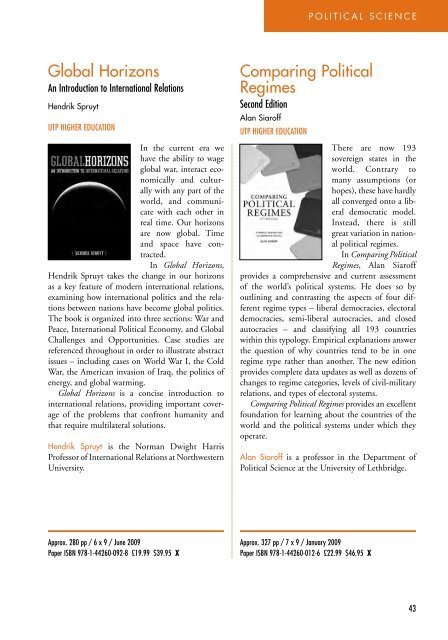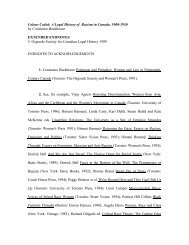Spring/Summer 2009 - University of Toronto Press Publishing
Spring/Summer 2009 - University of Toronto Press Publishing
Spring/Summer 2009 - University of Toronto Press Publishing
Create successful ePaper yourself
Turn your PDF publications into a flip-book with our unique Google optimized e-Paper software.
p o l i t i c a l s c i e n c e<br />
Global Horizons<br />
An Introduction to International Relations<br />
Hendrik Spruyt<br />
UTP Higher Education<br />
In the current era we<br />
have the ability to wage<br />
global war, interact economically<br />
and culturally<br />
with any part <strong>of</strong> the<br />
world, and communicate<br />
with each other in<br />
real time. Our horizons<br />
are now global. Time<br />
and space have contracted.<br />
In Global Horizons,<br />
Hendrik Spruyt takes the change in our horizons<br />
as a key feature <strong>of</strong> modern international relations,<br />
examining how international politics and the relations<br />
between nations have become global politics.<br />
The book is organized into three sections: War and<br />
Peace, International Political Economy, and Global<br />
Challenges and Opportunities. Case studies are<br />
referenced throughout in order to illustrate abstract<br />
issues – including cases on World War I, the Cold<br />
War, the American invasion <strong>of</strong> Iraq, the politics <strong>of</strong><br />
energy, and global warming.<br />
Global Horizons is a concise introduction to<br />
international relations, providing important coverage<br />
<strong>of</strong> the problems that confront humanity and<br />
that require multilateral solutions.<br />
Hendrik Spruyt is the Norman Dwight Harris<br />
Pr<strong>of</strong>essor <strong>of</strong> International Relations at Northwestern<br />
<strong>University</strong>.<br />
Comparing Political<br />
Regimes<br />
Second Edition<br />
Alan Siar<strong>of</strong>f<br />
uTP Higher Education<br />
There are now 193<br />
sovereign states in the<br />
world. Contrary to<br />
many assumptions (or<br />
hopes), these have hardly<br />
all converged onto a liberal<br />
democratic model.<br />
Instead, there is still<br />
great variation in national<br />
political regimes.<br />
In Comparing Political<br />
Regimes, Alan Siar<strong>of</strong>f<br />
provides a comprehensive and current assessment<br />
<strong>of</strong> the world’s political systems. He does so by<br />
outlining and contrasting the aspects <strong>of</strong> four different<br />
regime types – liberal democracies, electoral<br />
democracies, semi-liberal autocracies, and closed<br />
autocracies – and classifying all 193 countries<br />
within this typology. Empirical explanations answer<br />
the question <strong>of</strong> why countries tend to be in one<br />
regime type rather than another. The new edition<br />
provides complete data updates as well as dozens <strong>of</strong><br />
changes to regime categories, levels <strong>of</strong> civil-military<br />
relations, and types <strong>of</strong> electoral systems.<br />
Comparing Political Regimes provides an excellent<br />
foundation for learning about the countries <strong>of</strong> the<br />
world and the political systems under which they<br />
operate.<br />
Alan Siar<strong>of</strong>f is a pr<strong>of</strong>essor in the Department <strong>of</strong><br />
Political Science at the <strong>University</strong> <strong>of</strong> Lethbridge.<br />
Approx. 280 pp / 6 x 9 / June <strong>2009</strong><br />
Paper ISBN 978-1-44260-092-8 £19.99 $39.95 X<br />
Approx. 327 pp / 7 x 9 / January <strong>2009</strong><br />
Paper ISBN 978-1-44260-012-6 £22.99 $46.95 X<br />
43

















